The Global Sustainability Project (GSP) gives high school students the opportunity to actively engage in ecological sustainability, both locally and internationally.
Global Sustainability Project Overview
I. Overview
The Picerne Family Foundation created the Global Sustainability Project (GSP) in 2012. The Foundation is the leader of an active collaboration with Advanced Placement and International Baccalaureate science teachers and Ecology Project International. The Foundation is supporting an intensive educational and community service program in addition to providing scholarships for 10 junior year advanced placement (A.P.) or International Baccalaureate (I.B.) students, a teacher and a scientist to participate in scientific field expeditions in international wildlife reserves. Since the GSP was established, 148 students and 17 teachers from 15 high schools in Southern California have participated.

II. Goals
As ecological threats do not stop and start at national borders, there is increasing recognition that greater cross-cultural understanding is necessary for global ecological sustainability. It is the goal of this project to provide students who have evidenced the potential to be future leaders the opportunity:
- To increase their understanding of another culture very different than their own, and
- To contribute their skills in sustaining their environment, both locally and internationally.
The Global Sustainability Project is a rigorous year-long program that can have enduring impact on college, career and life style choices. The Foundation is eager to assist other schools and funders interested in adopting this model for their communities.
III. Project Leadership
The Picerne Family Foundation provides overall leadership, ongoing management and financial support of the program. The Foundation selects award winning A.P. and I.B. science teachers who have a demonstrated interest in engaging students in off-site ecological programs to lead the preparatory study and the service components of the project. They are also invited to accompany the students on the research expedition. The Foundation selects students enrolled in Advanced Placement and International Baccalaureate courses through a written and oral application process. The Foundation provides funding for materials to universities, nature conservancies and nonprofit organizations that support the students’ local service. The scientist or individual supervising the students’ local service project is invited to accompany the group on the overseas research expedition. The Foundation has engaged Ecology Project International to manage the overseas tour.
IV. The Global Sustainability Project
There are three linked parts to the GSP program:
- Expedition preparation. In order to enrich the overseas experience and make it more meaningful, participants as a team will prepare a resource guide to the Caribbean coast of Costa Rica. The guide will focus on the geography, climate, economy, history and culture of the area as well as the flora, felines and primates. Students will create an interactive electronic presentation on their research that they will present to Foundation members, parents and peers.
- Community Service. In the spirit of “giving back”, students are required to provide 40 hours of service to their community. Teachers develop specific projects with local wildlife conservancies and university research programs whose primary mission is ecological sustainability.
- Overseas expedition. After completing their preparation and service, the students, lead teacher and the supervisor of the field experience participate in 9-day international ecological research program conducted by the Ecology Project International in Costa Rica.
This intensive program is a unique opportunity for high school students. The Foundation is currently evaluating the personal impact, social value and replicability of the program. For more information go to www.picernefoundation.org.
Rancho Buena Vista High School Global Sustainability Project

The application deadline for the Global Sustainability Project at Rancho Buena Vista High has been extended. The new application deadline is Friday, November 21 at 3:30pm.
Late applications will not be accepted.
Eligibility requirements, applications and everything else you need to know about the Global Sustainability Project (GSP) are described below.
Ms. Kayli Dugas is leading the GSP at RBV. She can be contacted in room 131 or by email at kaylidugas@vistausd.org for questions about this opportunity for RBV juniors who will be taking Advanced Placement (A.P.) or International Baccalaureate (I.B.) courses during the 2025/26 school year.
Program Description
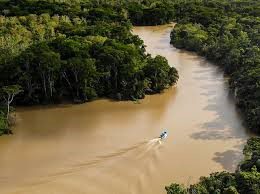
I. Overview
The Picerne Family Foundation has created The Global Sustainability Project (GSP) to provide high school students the opportunity to perform meaningful service in support of their community’s environment and to do intensive international environmental field research. The Foundation awards full scholarships to ten students, a teacher and a scientist to participate in a 9-day research expedition to the Pacuare Reserve on the Caribbean Coast of Costa Rica for 9 days of fieldwork on sea turtle ecology with Ecology Project International scientists. It is an intensive educational, experiential and service program. The Picerne Family Foundation initiated and is leading this program in collaboration with Advanced Placement and International Baccalaureate science teachers in Southern California, Ecology Project International, and local universities, nature conservancies and nonprofit organizations.
II. Goals
There is increasing recognition and acceptance that greater international cross-cultural understanding is necessary to achieve global ecological sustainability. Environmental threats do not stop and start at national borders. International collaboration requires a deep understanding and appreciation of other cultures. It is the goal of this project to provide students who have evidenced the potential to be future leaders the opportunity to:
- Develop an understanding and life experience with another culture very different than their own
- Contribute their skills in sustaining their environment, both locally and internationally.
The GSP is a rigorous program with the potential for enduring college, career and life style impact. This program emphasizes critical thinking and objective research-based decision making. These are important skills for students to have as they will soon be assuming responsibility for ensuring the well-being of the environment.
III. Project Leadership
The Picerne Family Foundation provides overall leadership, ongoing management and financial support of the program. The Foundation selects award winning A.P. and I.B. science teachers who have a demonstrated interest in engaging students in off-site ecological programs to lead the preparatory study and the service components of the project. They are also invited to accompany the students on the Costa Rica research expedition.
The Foundation selects students enrolled in A.P. or I.B. courses through a written and oral application process. The Foundation provides funding for materials to universities, nature conservancies and nonprofit organizations that are supporting the students’ local service. The scientist or individual supervising the students’ local service project is invited to accompany the group on the overseas research expedition. The Foundation has engaged Ecology Project International to manage the overseas tour.
IV. The Global Sustainability Project
There are three components of the GSP program: (1) local service, (2) expedition preparation and (3) the overseas research expedition.
- Local Service. Selected students are required to provide 40 hours of service during their junior year of high school on a project that will have significant impact in their community. The teacher develops an off-campus sustainability project in collaboration with a university, local conservancy and/or non-profit organization in their community.
- Expedition Preparation. In order to enrich the overseas experience and make it more meaningful, participants as a team will prepare a resource guide to the Caribbean coast of Costa Rica. The guide will focus on the geography, climate, economy, history and culture of the area as well as the flora, and sea turtle ecology. Students will create an interactive electronic presentation on their research that they will present to Foundation members, parents and peers.
- Overseas Expedition. During the summer after their junior year, 10 students, the teacher and scientist overseeing the local service project participate in a 9-day international conservation research program focused on sea turtle ecology conducted by Ecology Project International. Ecology Project International has connected more than 40,000 students with scientists on active research projects in the world’s most important ecological hot-spots for more than 20 years, and provides the infrastructure and resources needed for an international program for teenagers. The Costa Rica experience gives students the opportunity to do actual scientific data gathering in a field setting as well as immerse them in another culture.
This innovative three-part program designed by the Foundation is unique for American high school students. It is a first of its kind for the Ecology Project International. The Picerne Family Foundation is currently evaluating the personal impact and social value of the program as well as the potential for replicability of the program by funders in other interested communities.
Application & Information SCHS
To Apply: Download and complete GSP Application, Part 1 and turn it in to Ms. Dugas in Room 131. Application, Part 2 must be submitted as an email attachment to Mr. Nelson, Dr. Golden and Ms. Dugas. Directions can be found on Application, Part 2.
- GSP Application, Part 1
- GSP Application, Part 2
- Announcement Flyer
- Important Dates and Deadlines
- GSP Fact Sheet
- Expedition Information - Ecology Project International
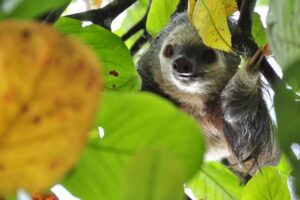
Costa Rica Expedition Details
- EPI Student Handbook
- EPI Policies and Logistics
- EPI Expedition Information
- Important Dates and Deadlines
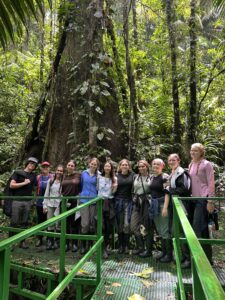
Required GSP Documents
Download and complete Picerne Foundation documents. Turn in hard copies to Ms. Dugas in Room 131.
Click Enroll on the Ecology International Project website at ecologyproject.org. You will then be able to log in, download and complete the required Ecology Project International documents below on the EPI Portal.
Corona Del Mar High School (CDM)
Global Sustainability Project

The application deadline for the Global Sustainability Project at CDM High School has been extended to Friday, November 1, 2024 at 3:30pm (No exceptions). Eligibility requirements, applications and everything else you need to know about the Global Sustainability Project (GSP) are described below.
Ms. Jennifer Walters and Ms. Kimberly Rapp are leading the GSP at CDM. Ms. Walters can be contacted in room 330 or by email, and Ms. Rapp can be contacted in room 318 or by email, with questions about this opportunity for CDM Juniors who will be taking A.P. courses during the 2024/25 school year.
Program Description

I. Overview
The Picerne Family Foundation has created The Global Sustainability Project (GSP) to provide high school students the opportunity to perform meaningful service in support of their community’s environment and to do intensive international environmental field research. The Foundation awards full scholarships to ten students, a teacher and a scientist to participate in a 9-day research expedition to the Pacuare Reserve on the Caribbean Coast of Costa Rica for 9 days of fieldwork with Ecology Project International scientists. It is an intensive educational, experiential and service program. The Picerne Family Foundation initiated and is leading this program in collaboration with Advanced Placement science teachers in Southern California, California, Ecology Project International, and local universities, nature conservancies and nonprofit organizations.
II. Goals
There is increasing recognition and acceptance that greater international cross-cultural understanding is necessary to achieve global ecological sustainability. Environmental threats do not stop and start at national borders. International collaboration requires a deep understanding and appreciation of other cultures. It is the goal of this project to provide students who have evidenced the potential to be future leaders the opportunity to:
- Develop an understanding and life experience with another culture very different than their own
- Contribute their skills in sustaining their environment, both locally and internationally.
The GSP is a rigorous program with the potential for enduring college, career and life style impact. This program emphasizes critical thinking and objective research-based decision making. These are important skills for students to have as they will soon be assuming responsibility for ensuring the well-being of the environment.
III. Project Leadership
The Picerne Family Foundation provides overall leadership, ongoing management and financial support of the program. The Foundation selects award winning A.P. science teachers who have a demonstrated interest in engaging students in off-site ecological programs to lead the preparatory study and the service components of the project. They are also invited to accompany the students on the Costa Rica research expedition.
The Foundation selects students enrolled in A.P. courses through a written and oral application process. The Foundation provides funding for materials to universities, nature conservancies and nonprofit organizations that are supporting the students’ local service. The scientist or individual supervising the students’ local service project is invited to accompany the group on the overseas research expedition. The Foundation has engaged Ecology Project International to manage the overseas tour.
IV. The Global Sustainability Project
There are three components of the GSP program: (1) local service, (2) expedition preparation and (3) the overseas research expedition.
1. Local Service. Selected students are required to provide 40 hours of service during their junior year of high school on a project that will have significant impact in their community. The teacher develops an off-campus sustainability project in collaboration with a university, local conservancy and/or non-profit organization in their community.
2. Expedition Preparation. In order to enrich the overseas experience and make it more meaningful, participants as a team will prepare a resource guide to the Caribbean coast of Costa Rica. The guide will focus on the geography, climate, economy, history and culture of the area as well as the flora, felines and primates. Students will create an interactive electronic presentation on their research that they will present to Foundation members, parents and peers.
3. Overseas Expedition. During the summer after their junior year, 10 students, the teacher and scientist overseeing the local service project participate in a 9-day international conservation research program conducted by Ecology Project International. Ecology Project International has connected more than 40,000 students with scientists on active research projects in the world’s most important ecological hot-spots for more than 20 years, and provides the infrastructure and resources needed for an international program for teenagers. The Costa Rica experience gives students the opportunity to do actual scientific data gathering in a field setting as well as immerse them in another culture.
This innovative three-part program designed by the Foundation is unique for American high school students. It is a first of its kind for the Ecology Project International. The Picerne Family Foundation is currently evaluating the personal impact and social value of the program as well as the potential for replicability of the program by funders in other interested communities.
Application & Information - Corona Del Mar
- Announcement Flyer - Corona Del Mar High
- GSP Application, Part 1 - Corona Del Mar High
- GSP Application, Part 2 - Corona Del Mar High
- Important Dates and Deadlines - Corona Del Mar High
- GSP Fact Sheet - Corona Del Mar High
- Expedition Information - Ecology Project International

Costa Rica Expedition Details - Corona Del Mar
- EPI Student Handbook
- EPI Policies and Logistics
- EPI Expedition Information
- Important Dates and Deadlines - Corona Del Mar

Required GSP Documents - Corona Del Mar
Download and complete Picerne Foundation documents. Turn in hard copies to Ms. Walters in room 330.
Click Enroll on the Ecology International Project website at www.ecologyproject.org/GSPCoronadelmar You will then be able to log in, download and/or complete the required Ecology Project International documents below on the EPI Portal.
- Important Dates and Deadlines - Corona Del Mar
- GSP Student Contract - Corona Del Mar
- Foundation Release of Liability
- Picture Use and Publishing Approval – GSP
- Online Medical Form - EPI Portal
- Physician Approval Form - EPI Portal
- Color Passport Copy - EPI Portal
- EPI Consent Form - EPI Portal
- Course Activity Forms - EPI Portal

San Clemente High School Global Sustainability Project

The application deadline for the Global Sustainability Project at San Clemente High School has been extended to Friday, November 1, 2024 at 1:30pm (No exceptions). Eligibility requirements, applications and everything else you need to know about the Global Sustainability Project (GSP) are described below.
Ms. Michelle Brislen is leading the GSP at SCHS. Ms. Brislen can be contacted in room P35 or by email with questions about this opportunity for SCHS Juniors who will be taking Advanced Placement (A.P.) or International Baccalaureate (I.B.) courses during the 2024/25 school year.
Program Description

I. Overview
The Picerne Family Foundation has created The Global Sustainability Project (GSP) to provide high school students the opportunity to perform meaningful service in support of their community’s environment and to do intensive international environmental field research. The Foundation awards full scholarships to ten students, a teacher and a scientist to participate in a 9-day research expedition to the Pacuare Reserve on the Caribbean Coast of Costa Rica for 9 days of fieldwork with Ecology Project International scientists. It is an intensive educational, experiential and service program. The Picerne Family Foundation initiated and is leading this program in collaboration with Advanced Placement and International Baccalaureate science teachers in Southern California, Ecology Project International, and local universities, nature conservancies and nonprofit organizations.
II. Goals
There is increasing recognition and acceptance that greater international cross-cultural understanding is necessary to achieve global ecological sustainability. Environmental threats do not stop and start at national borders. International collaboration requires a deep understanding and appreciation of other cultures. It is the goal of this project to provide students who have evidenced the potential to be future leaders the opportunity to:
- Develop an understanding and life experience with another culture very different than their own
- Contribute their skills in sustaining their environment, both locally and internationally.
The GSP is a rigorous program with the potential for enduring college, career and life style impact. This program emphasizes critical thinking and objective research-based decision making. These are important skills for students to have as they will soon be assuming responsibility for ensuring the well-being of the environment.
III. Project Leadership
The Picerne Family Foundation provides overall leadership, ongoing management and financial support of the program. The Foundation selects award winning A.P. and I.B. science teachers who have a demonstrated interest in engaging students in off-site ecological programs to lead the preparatory study and the service components of the project. They are also invited to accompany the students on the Costa Rica research expedition.
The Foundation selects students enrolled in A.P. or I.B. courses through a written and oral application process. The Foundation provides funding for materials to universities, nature conservancies and nonprofit organizations that are supporting the students’ local service. The scientist or individual supervising the students’ local service project is invited to accompany the group on the overseas research expedition. The Foundation has engaged Ecology Project International to manage the overseas tour.
IV. The Global Sustainability Project
There are three components of the GSP program: (1) local service, (2) expedition preparation and (3) the overseas research expedition.
1. Local Service. Selected students are required to provide 40 hours of service during their junior year of high school on a project that will have significant impact in their community. The teacher develops an off-campus sustainability project in collaboration with a university, local conservancy and/or non-profit organization in their community.
2. Expedition Preparation. In order to enrich the overseas experience and make it more meaningful, participants as a team will prepare a resource guide to the Caribbean coast of Costa Rica. The guide will focus on the geography, climate, economy, history and culture of the area as well as the flora, felines and primates. Students will create an interactive electronic presentation on their research that they will present to Foundation members, parents and peers.
3. Overseas Expedition. During the summer after their junior year, 10 students, the teacher and scientist overseeing the local service project participate in a 9-day international conservation research program conducted by Ecology Project International. Ecology Project International has connected more than 40,000 students with scientists on active research projects in the world’s most important ecological hot-spots for more than 20 years, and provides the infrastructure and resources needed for an international program for teenagers. The Costa Rica experience gives students the opportunity to do actual scientific data gathering in a field setting as well as immerse them in another culture.
This innovative three-part program designed by the Foundation is unique for American high school students. It is a first of its kind for the Ecology Project International. The Picerne Family Foundation is currently evaluating the personal impact and social value of the program as well as the potential for replicability of the program by funders in other interested communities.
Application & Information SCHS
- Announcement Flyer - SCHS
- GSP Application, Part 1 - SCHS
- GSP Application, Part 2 - SCHS
- Important Dates and Deadlines - SCHS
- GSP Fact Sheet - SCHS
- Expedition Information - Ecology Project International

Costa Rica Expedition Details - SCHS
- EPI Student Handbook
- EPI Policies and Logistics
- EPI Expedition Information
- Important Dates and Deadlines - SCHS

Required GSP Documents - SCHS
Download and complete Picerne Foundation documents. Turn in hard copies to Ms. Brislen in room P35.
Click Enroll on the Ecology International Project website at www.ecologyproject.org/GSPSanClemente. You will then be able to log in, download and complete the required Ecology Project International documents below on the EPI Portal.
- Important Dates and Deadlines - SCHS
- GSP Student Contract - SCHS
- Foundation Release of Liability
- Picture Use and Publishing Approval – GSP
- Online Medical Form - EPI Portal
- Physician Approval Form - EPI Portal
- Color Passport Copy - EPI Portal
- EPI Consent Form - EPI Portal
- Course Activity Forms - EPI Portal

Dana Hills High School Global Sustainability Project

The application deadline for the Global Sustainability Project at Dana Hills High School (DHHS) is Friday, October 20, 2023 at 3:00pm (no exceptions).
Eligibility requirements, applications and everything else you need to know about the Global Sustainability Project (GSP) is described below. Detailed information about the South Africa expedition can be found by clicking on the expedition briefing link below:
Earthwatch South Africa Expedition Briefing
Ms. Dolores Dang-Wright is leading the GSP program at Dana Hills High School. We strongly recommend interested students bring their parents to the Student Parent Information Meeting in Ms. Dang-Wright's classroom (# 823) on Tuesday, Sept. 26 at 6:00pm. Students may also contact Ms. Dang-Wright by email or in her classroom to discuss this opportunity for Juniors who are taking Advanced Placement courses in any subject during the 2023/24 school year at DHHS.
Program Description - DHHS
I. Overview
The Picerne Family Foundation has created The Global Sustainability Project (GSP) to provide high school students the opportunity to perform meaningful service in support of their community’s environment and to do intensive international environmental field research. The Foundation awards full scholarships to ten students, a teacher and a scientist to participate in a research expedition to South Africa’s Mankwe Wildlife Reserve. Students participating in the South Africa expedition will aid research scientists studying ecological sustainability among Africa’s wildlife, particularly endangered rhinos.
II. Goals
There is increasing recognition and acceptance that greater international cross-cultural understanding is necessary to achieve global ecological sustainability. Environmental threats do not stop and start at national borders. International collaboration requires a deep understanding and appreciation of other cultures. It is the goal of this project to provide students, who have evidenced the potential to be future leaders, the opportunity to:
- Develop an understanding and life experience with another culture very different than their own.
- Contribute their skills in sustaining their environment, both locally and internationally.
The GSP is a rigorous program with the potential for enduring college, career and life style impact. This program emphasizes critical thinking and objective research-based decision-making. These are important skills for students to have, as they will soon be assuming responsibility for ensuring the well-being of the environment.
III. Project Leadership
The Picerne Family Foundation provides overall leadership, ongoing management and financial support of the program. The Foundation selects award winning Advanced Placement science teachers who have a demonstrated interest in engaging students in off-site ecological programs to lead the preparatory study and the service components of the project. They are also invited to accompany the students on the research expedition. The Foundation selects students enrolled in Advanced Placement courses through a written and oral application process. The Foundation provides funding for materials to universities, nature conservancies and nonprofit organizations that are supporting the students’ local service. The scientist or individual supervising the students’ local service project is invited to accompany the group on the overseas research expedition. The Foundation has engaged the Earthwatch Institute to manage the overseas tour.
IV. The Global Sustainability Project
There are three components of the GSP program: (1) local service, (2) expedition preparation and (3) the overseas research expedition.
1. Local Service. Selected students are required to provide 40 hours of service during their junior year of high school on a project that will have significant impact in their community. The teacher develops an off-campus sustainability project in collaboration with a university, local conservancy and/or non-profit organization in their community.
2. Expedition Preparation. The teacher plans an intensive study program prior to the expedition in order to prepare students. Students gain knowledge and understanding of the plants, wildlife, ecology, culture and history of the country they are to visit. The intent is to enrich their overseas experience, making it more personally impactful and meaningful.
3. Overseas Expedition. During the summer after their junior year, 10 students, the teacher and service project supervisor participate in a 12 day international conservation research program conducted by the Earthwatch Institute. Earthwatch is a nonprofit organization that has been supporting field research scientists all over the world for over 40 years. Earthwatch provides the infrastructure and resources needed for an international program for teenagers. It has been named the #1 educational ecotourism organization by National Geographic (www.earthwatch.org). The South Africa experience gives students the opportunity to do actual scientific data gathering in a field setting as well as immerse them in another culture.
This innovative three-part program designed by the Foundation is unique for American high school students. It is a first of its kind for the Earthwatch Institute. The Picerne Family Foundation is currently evaluating the personal impact and social value of the program as well as the potential for replicability of the program by funders in other interested communities.
Application & Information - DHHS
- Announcement Flyer GSP DHHS
- Application GSP Part 1 DHHS
- Application-GSP-Part-2-DHHS
- Fact Sheet DHHS
- GSP Important Dates DHHS
- Ms. Dang-Wright Biography
- Parent & Student Presentation Night
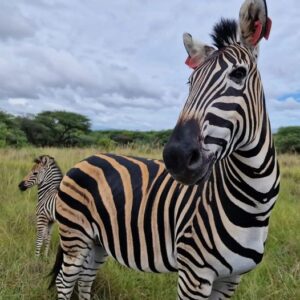
South Africa Expedition Details - DHHS
- Earthwatch South Africa Expedition Briefing.
- Parent & Student Program Orientation.
- GSP Important Dates DHHS
- Earthwatch Participation Form - DHHS. (Coming Soon)
- Passport Application Information
- Travel Health and Safety Information
- Earthwatch COVID-19 Policy
- Introducing Earthwatch.
- South Africa CDM, Aug., 2016 by Lauren Oberreiiter.
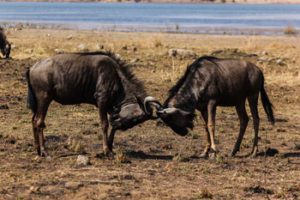
Required Documents - DHHS
- GSP Important Dates DHHS
- Student Contract - GSP
- Release of Liability - DHHS
- Picture Use and Publishing Approval
- Earthwatch Participation Form - DHHS
- Doctor's Approval Form
- Earthwatch Participation Form - EHS
- Affidavit of Consent for Children Traveling Abroad
- Mankwe Wildlife Reserve Camp Rules
- Doumishand Indemnity Form
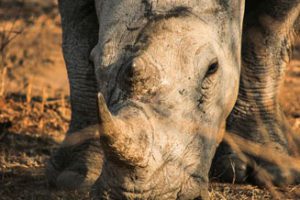
Local Sustainability Project - DHHS
A cornerstone of the Global Sustainability Project (GSP) is the requirement that students provide 40 hours of direct service to a nature conservancy or nonprofit ecology organization in their community. The Foundation strongly believes that students should develop an ethic of responsibility for their environment, both locally and globally. The Foundation requires this hands-on service to allow the students to “pay forward” the opportunity they have been afforded in participating in the Earthwatch expedition. More information about the DHHS Local Sustainability Project will be coming soon. In the meantime, see Ms. Dang-Wright in Her classroom (# 823) for more information.
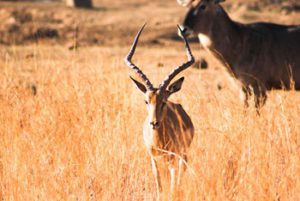
Edison High School Global Sustainability Project
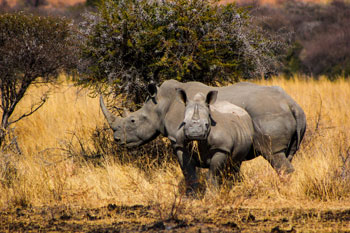
The application deadline for the Global Sustainability Project at Edison High School is Wednesday, Oct. 25, 2023 at 4:00pm (No exceptions).
Eligibility requirements, applications and everything else you need to know about the Global Sustainability Project (GSP) is described below. Detailed information about the South Africa expedition can be found by clicking on the expedition briefing link below:
Earthwatch South Africa Expedition Briefing
Mr. Gardiner is leading the GSP program at Edison High School (EHS). We strongly recommend interested students bring their parents to the Student Parent Information Meeting in the EHS Student Center (Cafeteria) on Wednesday, September 27, 2023 at 6:30pm. Contact Mr. Gardiner in his classroom or by email if you have questions about this opportunity for EHS Juniors who will be taking A.P. courses, or participating in the Academy of Sustainability & Engineering (ASE) Program, or participating in the Dual Enrollment Aquarium Science/Aqua Culture program during the 2023/24 school year.
Program Description

I. Overview
The Picerne Family Foundation has created The Global Sustainability Project (GSP) to provide high school students the opportunity to perform meaningful service in support of their community’s environment and to do intensive international environmental field research. The Foundation awards full scholarships to ten students, a teacher and a scientist to participate in a 12-day research expedition to South Africa’s Mankwe Wildlife Reserve where they will aid research scientists studying ecological sustainability among Africa’s wildlife. It is an intensive educational, experiential and service program. The Picerne Family Foundation initiated and is leading this program in collaboration with Advanced Placement science teachers in Southern California, California, the Earthwatch Institute, and local universities, nature conservancies and nonprofit organizations.
II. Goals
There is increasing recognition and acceptance that greater international cross-cultural understanding is necessary to achieve global ecological sustainability. Environmental threats do not stop and start at national borders. International collaboration requires a deep understanding and appreciation of other cultures. It is the goal of this project to provide students who have evidenced the potential to be future leaders the opportunity to:
- Develop an understanding and life experience with another culture very different than
their own - Contribute their skills in sustaining their environment, both locally and internationally.
The GSP is a rigorous program with the potential for enduring college, career and life style impact. This program emphasizes critical thinking and objective research-based decision making. These are important skills for students to have as they will soon be assuming responsibility for ensuring the well-being of the environment.
III. Project Leadership
The Picerne Family Foundation provides overall leadership, ongoing management and financial support of the program. The Foundation selects award winning A.P. science teachers who have a demonstrated interest in engaging students in off-site ecological programs to lead the preparatory study and the service components of the project. They are also invited to accompany the students on the South Africa research expedition. The Foundation selects students enrolled in A.P. or ASE courses through a written and oral application process. The Foundation provides funding for materials to universities, nature conservancies and nonprofit organizations that are supporting the students’ local service. The scientist or individual supervising the students’ local service project is invited to accompany the group on the overseas research expedition. The Foundation has engaged the Earthwatch Institute to manage the overseas tour.
IV. The Global Sustainability Project
There are three components of the GSP program: (1) local service, (2) expedition preparation and (3) the overseas research expedition.
1. Local Service. Selected students are required to provide 40 hours of service during their junior year of high school on a project that will have significant impact in their community. The teacher develops an off-campus sustainability project in collaboration with a university, local conservancy and/or non-profit organization in their community.
2. Expedition Preparation. The teacher plans an intensive study program prior to the expedition in order to prepare students. Students gain knowledge and understanding of the plants, wildlife, ecology, culture and history of the country they are to visit. The intent is to enrich their overseas experience, making it more personally impactful and meaningful.
3. Overseas Expedition. During the summer after their junior year, 10 students, the teacher and service project supervisor participate in a 12-day international conservation research program conducted by the Earthwatch Institute. Earthwatch is a nonprofit organization that has been supporting field research scientists all over the world for over 40 years. Earthwatch provides the infrastructure and resources needed for an international program for teenagers. It has been named the #1 educational ecotourism organization by National Geographic (earthwatch.org). The South African experience gives students the opportunity to do actual scientific data gathering in a field setting as well as immerse them in another culture.
This innovative three-part program designed by the Foundation is unique for American high school students. It is a first of its kind for the Earthwatch Institute. The Picerne Family Foundation is currently evaluating the personal impact and social value of the program as well as the potential for replicability of the program by funders in other interested communities.
Application & Information EHS
- Announcement Flyer GSP EHS
- GSP Application Part 1 EHS
- GSP Application Part-2 EHS
- GSP Important Dates EHS
- Fact Sheet EHS
- Parent Student Information Night

South Africa Expedition Details - EHS
- Earthwatch South Africa Expedition Briefing
- Walking With Purpose
- GSP Important Dates EHS
- Earthwatch Travel Checklist
- Passports and Travel Documents
- Travel Health and Safety Information
- Earthwatch COVID-19 Vaccination Policy
- GSP Slide Show
- Introducing Earthwatch
- South Africa CDM Aug 2016 by Lauren Oberreiter
- Rhino Research Methods and Training 1
- Rhino Research Methods and Training 2

Required GSP Documents - EHS
- GSP Important Dates EHS
- Student Contract GSP - EHS
- Release of Liability - EHS
- Picture Use and Publishing Approval – GSP
- Earthwatch Participation Form - EHS (coming soon)
- Doctor’s Approval Form
- Affidavit of Consent for Children Traveling Abroad
- Mankwe Wildlife Reserve Camp Rules
- Doumishand Indemnity Form
Local Sustainability Project - Edison High School
A cornerstone of the Global Sustainability Project (GSP) is the requirement that students provide 40 hours of direct service to a nature conservancy, university or nonprofit ecology organization in their community. The Foundation strongly believes that students should develop an ethic of responsibility for their environment, both locally and globally. The Foundation requires this hands-on service to allow the students to “pay forward” the opportunity they have been afforded in participating in the Earthwatch expedition.
Information about the Edison High School local sustainability project is coming soon. In the meantime, please see Mr. Gardiner with questions about the local project.
El Modena High School Global Sustainability Project
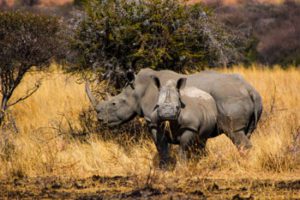
The application deadline for the Global Sustainability Project (GSP) at El Modena High School (EMHS) is Friday, September 28, 2018 at 3:00pm (No exceptions). Scroll down to find out about GSP eligibility requirements and everything else you need to know. Ms. Quihuiz is leading the GSP program at EMHS. Contact Ms. Quihuiz by email or in her classroom if you have questions about this opportunity for Juniors who will be taking A.P. or Honors courses during the 2018/19 school year at EMHS.
Program Description - El Modena High School

I. Overview
The Picerne Family Foundation has created The Global Sustainability Project (GSP) to provide high school students the opportunity to perform meaningful service in support of their community’s environment and to do intensive international environmental field research. The Foundation awards full scholarships to ten students, a teacher and a scientist to participate in a 12-day research expedition to South Africa’s Mankwe Wildlife Reserve where they will aid research scientists studying ecological sustainability among Africa’s wildlife. It is an intensive educational, experiential and service program. The Picerne Family Foundation initiated and is leading this program in collaboration with Advanced Placement science teachers in Southern California, California, the Earthwatch Institute, and local universities, nature conservancies and nonprofit organizations.
II. Goals
There is increasing recognition and acceptance that greater international cross-cultural understanding is necessary to achieve global ecological sustainability. Environmental threats do not stop and start at national borders. International collaboration requires a deep understanding and appreciation of other cultures. It is the goal of this project to provide students who have evidenced the potential to be future leaders the opportunity to:
• Develop an understanding and life experience with another culture very different than
their own
• Contribute their skills in sustaining their environment, both locally and
internationally.
The GSP is a rigorous program with the potential for enduring college, career and life style impact. This program emphasizes critical thinking and objective research-based decision making. These are important skills for students to have as they will soon be assuming responsibility for ensuring the well-being of the environment.
III. Project Leadership
The Picerne Family Foundation provides overall leadership, ongoing management and financial support of the program. The Foundation selects award winning Advanced Placement science teachers who have a demonstrated interest in engaging students in off-site ecological programs to lead the preparatory study and the service components of the project. They are also invited to accompany the students on the research expedition. The Foundation selects students enrolled in Advanced Placement or International Baccalaureate courses through a written and oral application process. The Foundation provides funding for materials to universities, nature conservancies and nonprofit organizations that are supporting the students’ local service. The scientist or individual supervising the students’ local service project is invited to accompany the group on the overseas research expedition. The Foundation has engaged the Earthwatch Institute to manage the overseas tour.
IV. The Global Sustainability Project
There are three components of the GSP program: (1) local service, (2) expedition preparation and (3) the overseas research expedition.
1. Local Service. Selected students are required to provide 40 hours of service during their junior year of high school on a project that will have significant impact in their community. The teacher develops an off-campus sustainability project in collaboration with a university, local conservancy and/or non-profit organization in their community.
2. Expedition Preparation. The teacher plans an intensive study program prior to the expedition in order to prepare students. Students gain knowledge and understanding of the plants, wildlife, ecology, culture and history of the country they are to visit. The intent is to enrich their overseas experience, making it more personally impactful and meaningful.
3. Overseas Expedition. During the summer after their junior year, 10 students, the teacher and service project supervisor participate in a 12-day international conservation research program conducted by the Earthwatch Institute. Earthwatch is a nonprofit organization that has been supporting field research scientists all over the world for over 40 years. Earthwatch provides the infrastructure and resources needed for an international program for teenagers. It has been named the #1 educational ecotourism organization by National Geographic (www.earthwatch.org). The South African experience gives students the opportunity to do actual scientific data gathering in a field setting as well as immerse them in another culture.
This innovative three-part program designed by the Foundation is unique for American high school students. It is a first of its kind for the Earthwatch Institute. The Picerne Family Foundation is currently evaluating the personal impact and social value of the program as well as the potential for replicability of the program by funders in other interested communities.
Application & Information - EMHS
• Announcement GSP EMHS
• Application Part 1 EMHS
• Application Part 2 EMHS
• Fact Sheet EMHS
• Important Dates to Remember EMHS
• Parent Night Presentation

South Africa Expedition Details - El Modena High School
- Expedition Briefing
- Walking with Purpose
- Important Dates to Remember
- Earthwatch Checklist
- Passport Application Information
- Travel Health and Safety Information
- GSP Slide Show
- South Africa CDM Aug 2016 by Lauren Oberreiter
- Rhino Research Methods and Training 1
- Rhino Research Methods and Training 2

Required GSP Documents - El Modena High School
- Important Dates to Remember
- Student Contract – GSP
- Release of Liability – Picerne Family Foundation
- Picture Use and Publishing Approval – GSP
- Earthwatch Participation Form: Teen
- Doctor’s Approval Form
- Affidavit of Consent for Children Travelling Abroad
- Mankwe Wildlife Reserve Camp Rules
- Doumishand Indemnity Form
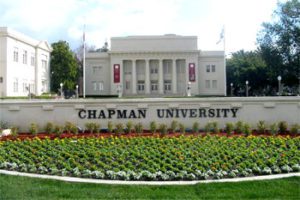
Local Sustainability Projects - El Modena High School
A cornerstone of the Global Sustainability Project (GSP) is the requirement that students provide 40 hours of direct service to a nature conservancy, university or nonprofit ecology organization in their community. The Foundation strongly believes that students should develop an ethic of responsibility for their environment, both locally and globally. The Foundation requires this hands-on service to allow the students to “pay forward” the opportunity they have been afforded in participating in the Earthwatch expedition.
The GSP students from El Modena High School are assisting Dr. Jennifer Funk in her research at Chapman University. Dr. Funk’s research is aimed at understanding how plants respond to reduced water availability, the factors contribute to plant invasiveness, and the functional traits of invasive and native species.
Students complete many weekly research tasks in the lab at Chapman University, including sample preparation, seed measurements, root measurements and data entry. Students also take precise measurements of small samples of leaf and soil matter for chemical analysis. Using a microbalance, they prepare small tins containing samples and run them against a standard curve for comparison. These samples are also analyzed for both nitrogen and carbon content, revealing important characteristics of their growth and storage capacities.
Fieldwork allows the students to participate in multiple levels of the research and gain a well-rounded understanding of the overall project. At Dr. Funk’s field site, students measure plant growth under different watering conditions at multiple points throughout the growing season. They also maintain plants and participate in field site maintenance.
Students keep a journal of their activities and findings. They discuss the progress of the research studies and address thoughts and questions related to the research in bi-monthly meetings. The students hope to make an academic poster presentation of their findings on the Chapman University Campus at the end of the school year
Segerstrom High School Global Sustainability Project
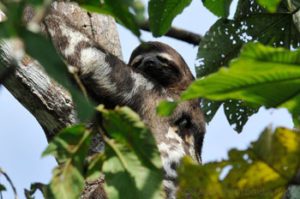
The Global Sustainability Project application deadline at Segerstrom High School (SHS) is Tuesday, Oct. 1, 2019 at 3:00pm (no exceptions).
Eligibility requirements, applications and everything else you need to know about the Global Sustainability Project (GSP) is described below. Mr. Thomas Pfeifer is leading the GSP program at Segerstrom High School (Mr. Pfeifer Biography). We strongly recommend interested students bring their parents to the Student/Parent Information meeting in Mr. Pfeifer’s classroom on Thursday, August 29, 2019 at 6:30pm (Science Building D, #306). In addition, students may contact Mr. Pfeifer by email or in his classroom to discuss this opportunity for Juniors who will be taking Advanced Placement courses during the 2019/20 school year at SHS.
Program Description - SHS
I. Overview
The Picerne Family Foundation has created The Global Sustainability Project (GSP) to provide high school students the opportunity to perform meaningful service in support of their community’s environment and to do intensive international environmental field research. The Foundation awards full scholarships to ten students, a teacher and a scientist to participate in a research expedition to South Africa’s Mankwe Wildlife Reserve or the Pacaya-Samiria National Reserve in the Peruvian Amazon. Students participating in the South Africa expedition will aid research scientists studying ecological sustainability among Africa’s wildlife, particularly endangered rhinos. In the Peruvian Amazon, students will assist research scientists in efforts to understand the impact of climate change on the flooded forest ecosystem and local indigenous people in the western Amazon.
II. Goals
There is increasing recognition and acceptance that greater international cross-cultural understanding is necessary to achieve global ecological sustainability. Environmental threats do not stop and start at national borders. International collaboration requires a deep understanding and appreciation of other cultures. It is the goal of this project to provide students, who have evidenced the potential to be future leaders, the opportunity to:
- Develop an understanding and life experience with another culture very different than their own.
- Contribute their skills in sustaining their environment, both locally and internationally.
The GSP is a rigorous program with the potential for enduring college, career and life style impact. This program emphasizes critical thinking and objective research-based decision-making. These are important skills for students to have, as they will soon be assuming responsibility for ensuring the well-being of the environment.
III. Project Leadership
The Picerne Family Foundation provides overall leadership, ongoing management and financial support of the program. The Foundation selects award winning Advanced Placement science teachers who have a demonstrated interest in engaging students in off-site ecological programs to lead the preparatory study and the service components of the project. They are also invited to accompany the students on the research expedition. The Foundation selects students enrolled in Advanced Placement courses through a written and oral application process. The Foundation provides funding for materials to universities, nature conservancies and nonprofit organizations that are supporting the students’ local service. The scientist or individual supervising the students’ local service project is invited to accompany the group on the overseas research expedition. The Foundation has engaged the Earthwatch Institute to manage the overseas tour.
IV. The Global Sustainability Project
There are three components of the GSP program: (1) local service, (2) expedition preparation and (3) the overseas research expedition.
1. Local Service. Selected students are required to provide 40 hours of service during their junior year of high school on a project that will have significant impact in their community. The teacher develops an off-campus sustainability project in collaboration with a university, local conservancy and/or non-profit organization in their community.
2. Expedition Preparation. The teacher plans an intensive study program prior to the expedition in order to prepare students. Students gain knowledge and understanding of the plants, wildlife, ecology, culture and history of the country they are to visit. The intent is to enrich their overseas experience, making it more personally impactful and meaningful.
3. Overseas Expedition. During the summer after their junior year, 10 students, the teacher and service project supervisor participate in a 10 to 15 day international conservation research program conducted by the Earthwatch Institute. Earthwatch is a nonprofit organization that has been supporting field research scientists all over the world for over 40 years. Earthwatch provides the infrastructure and resources needed for an international program for teenagers. It has been named the #1 educational ecotourism organization by National Geographic (www.earthwatch.org). The South Africa and Peruvian Amazon experiences give students the opportunity to do actual scientific data gathering in a field setting as well as immerse them in another culture.
This innovative three-part program designed by the Foundation is unique for American high school students. It is a first of its kind for the Earthwatch Institute. The Picerne Family Foundation is currently evaluating the personal impact and social value of the program as well as the potential for replicability of the program by funders in other interested communities.
Application & Information - SHS
- Announcement GSP - SHS
- Application GSP Part 1 SHS
- Application GSP Part 2 SHS
- Fact Sheet SHS
- Important Dates and Deadlines - SHS
- Mr. Pfeifer Biography
- Parent Student Night Presentation

Amazon Riverboat Expedition Details - SHS
- Earthwatch Amazon Expedition Briefing
- Important Dates and Deadlines - SHS
- Earthwatch Participation Form
- Passport Application Information
- Travel Health and Safety Information
- Introducing Earthwatch
- Climate Change in the Samiria River Basin

Required GSP Documents - SHS
- Important Dates and Deadlines - SHS
- Student Contract - GSP
- Release of Liability - SHS
- Picture Use and Publishing Approval
- Earthwatch Participation Form - SHS
- Doctor's Approval Form
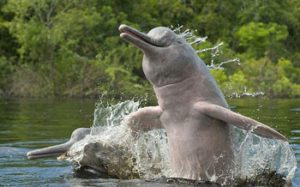
Local Sustainability Project - SHS
A cornerstone of the Global Sustainability Project (GSP) is the requirement that students provide 40 hours of direct service to a nature conservancy or nonprofit ecology organization in their community. The Foundation strongly believes that students should develop an ethic of responsibility for their environment, both locally and globally. The Foundation requires this hands-on service to allow the students to “pay forward” the opportunity they have been afforded in participating in the Earthwatch expedition. More information about the SHS Local Sustainability Project will be coming soon. In the meantime see Mr. Pfeifer in his classroom (Science Building D, #306) for more information.
Previous High Schools
A cornerstone of the GSP is the requirement that students provide 40 hours of direct service to a nature conservancy or nonprofit ecology organization in their community. The Foundation strongly believes that students should develop an ethic of responsibility for their environment, both locally and globally. This hands-on service requirement allows GSP students to “pay forward” the opportunity they have been afforded to participate in the Earthwatch expedition.
Since the GSP was established, 148 students and 16 teachers from 14 high schools in Southern California have contributed more than 6,000 hours in direct service to the local community and 10,000 hours of fieldwork overseas. Below you will find information about the schools’ local projects and activities of students at who have completed this year long intensive program.
Carlsbad High School 2017/18
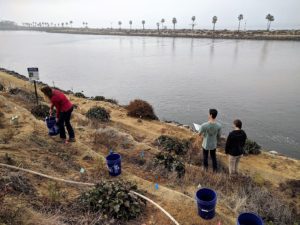 Ten Global Sustainability Project participants from Carlsbad High designed and implemented a project to control erosion of the coastal bluff habitat bordering the Agua Hedionda Lagoon in Carlsbad California. The area of focus was a section of bluffs with heavy human foot traffic. People crisscross the bluff as they walk down to get to the water’s edge. The foot traffic causes damage to native vegetation. The foot traffic and damage to plants, leads to the erosion of soil on the bluff. Students worked in conjunction with Kyle Lunneberg, Trail Development Manager at the Agua Hedionda Lagoon Foundation ~ Discovery Center to plant native plans and install soil erosion devices. Signs, fences, borders were installed to encourage use of a designated path while deterring walking down the newly repaired and replanted bluff. Plants were watered until established. Students made observations during and directly after rainstorms to measure water flow and soil erosion within the project site. They consulted with scientists to identify and implement any additional erosion control measures. In addition to completing the above project, students became teachers and developed a native plant curriculum for third graders. The curriculum focused on why native plants are important, and used a global positioning cell phone application to help the young participants track their observations.
Ten Global Sustainability Project participants from Carlsbad High designed and implemented a project to control erosion of the coastal bluff habitat bordering the Agua Hedionda Lagoon in Carlsbad California. The area of focus was a section of bluffs with heavy human foot traffic. People crisscross the bluff as they walk down to get to the water’s edge. The foot traffic causes damage to native vegetation. The foot traffic and damage to plants, leads to the erosion of soil on the bluff. Students worked in conjunction with Kyle Lunneberg, Trail Development Manager at the Agua Hedionda Lagoon Foundation ~ Discovery Center to plant native plans and install soil erosion devices. Signs, fences, borders were installed to encourage use of a designated path while deterring walking down the newly repaired and replanted bluff. Plants were watered until established. Students made observations during and directly after rainstorms to measure water flow and soil erosion within the project site. They consulted with scientists to identify and implement any additional erosion control measures. In addition to completing the above project, students became teachers and developed a native plant curriculum for third graders. The curriculum focused on why native plants are important, and used a global positioning cell phone application to help the young participants track their observations.
After completing the local project, students traveled to Mankwe Wildlife reserve with their teacher Tod Muilenberg and Kyle Lunneberg to assist South African biologists in their efforts to conserve and manage remaining rhino populations.
Corona del Mar High School 2015/16
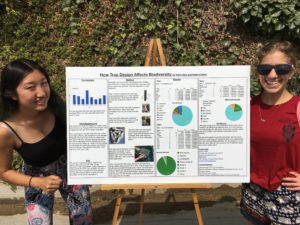
Ten Corona del Mar High School GSP students traveled to Mankwe Wildlife Reserve and Pilanesberg National Park in South Africa to assist Earthwatch Scientists in their efforts to study the impact of de-horning endangered rhinos on rhino behavior and on the larger ecosystem. Before departing, they worked closely with the City of Newport Beach on a California spiny lobster field study. The goal of this project was to improve the fisheries and also to understand the role recreational and commercial fishing have on the biodiversity within the marine protected areas. Students researched the methods of trapping and collecting the lobsters, then designed and constructed their own traps. After learning the correct protocols for extracting the post larval lobsters from the traps, they prepped trap samples to be sent to marine biological consultants. Students presented the results of their work on biodiversity in poster sessions to the beachgoing public in Newport Beach. They were led by Jennifer Walters and Kimberly Rapp, their A.P. Biology and Environmental Science teachers at CDM, who traveled to South Africa with them.
Dana Hills High School 2014/15

In 2014, Crystal Cove Alliance (CCA) helped to launch the Michael and Tricia Berns Environmental Study Loop, an innovative new facility that engages visitors in the science of park conservation. Ten GSP students from Dana Hills High School collaborated with CCA to help develop and refine a new STEM program for high school students and the public to use along a half-mile hiking trail with eight field research stations at Crystal Cove State Park. They also designed a hands-on lab field station using trap cameras for future students and teachers to use during field trips. Students collected camera trap data about which animals frequent the area, the roles that different animals play in the ecosystem, animal feeding habits, native plants and invasive plants. They also looked at evidence of trespassers and human activity affecting the wildlife using the trap cameras. They used this data to inform the educational field stations at the loop, and to make management recommendations to Crystal Cove State Park and Crystal Cove Alliance.
After completing their project with Crystal Cove, Dana High GSP students traveled to Mankwe Wildlife Reserve and Pilanesberg National Park to conduct fieldwork aimed at understanding the brown hyena and other endangered species’ impact on ecosystems and biodiversity of the area. The students were led by Dolores Dang-Wright, their A.P. Environmental Studies teacher. They were accompanied to South Africa by Ms. Dang-Wright and Sara Ludovise, a Crystal Cove Alliance science educator who worked with them on their local project.
Early College High School 2013/14
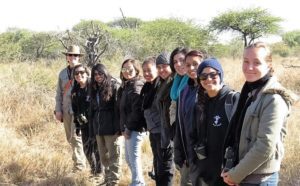
For their local service project, Early College High GSP students conducted research to understand zooplankton in Newport Bay and the nearby ocean with Peter Bryant, Ph.D., a Professor at University of California, Irvine (UCI). The project involved collecting zooplankton with a net, either from various docks or from boats, bringing it back to Dr. Bryant’s research laboratory at UCI and analyzing it by photo-or video-microscopy.
Zooplankton contains both adult stages of organisms that spend their lives in the plankton, and also the larval stages of organisms including mollusks and annelids that usually settle on to ocean or bay floor. Until recently, matching up the larval stages with the adult counterparts was difficult and expensive since it involved rearing these animals in captivity. However, the same goal can now be achieved by DNA barcoding, in which individuals of a given species will share a DNA sequence that is absent from other species. GSP students used this new and efficient method for analyzing the biodiversity of aquatic ecosystems. They collected both larval and adult specimens of these animals, and used them to obtain species-specific DNA sequence information. One exciting outcome of the students’ lab work was their discovery of a specimen in Newport Bay that was previously thought only to exist off the coast of Japan.
After completing the research, students were accompanied by Candace Luethold, Early College Vice Principal, to Mankwe Wildlife Reserve and Pilanesberg National Park to conduct fieldwork aimed at understanding the brown hyena and other endangered species for Earthwatch scientists studying the role of scavengers in maintaining ecosystems and biodiversity of the area.
Gahr High School 2016/17

Ms. Quyen Vu, GHS A.P. Environmental Studies Teacher, led ten advanced placement Gahr High School (GHS) students in a water quality project for the City of Cerritos, CA and the California Department of Fish and Wildlife. Students identified and monitored invasive species such as zebra mussels, quagga mussels, mud snails, fish, and turtles in the lakes at Cerritos Regional Park and Heritage Park in Cerritos, California. They tested water quality and evaluated the effectiveness of a public education strategy they designed to reduce invasive species and improve the water quality of Cerritos Regional Park. Not only was their environmental education material adopted by the City of Cerritos and the California Department of Fish and Wildlife, their 30-page research findings were accepted for publication by The International Journal of Innovation & Scholarly Research, 2018. Ms. Vu and the students’ A.P. Biology teacher, Tam Lam, accompanied them on their research expedition to South Africa where they assisted Earthwatch Scientists in their efforts to monitor and assess the impact of de-horning endangered rhinos on rhino behavior and the larger ecosystem.
Ocean View High School 2011/12 and 2012/13
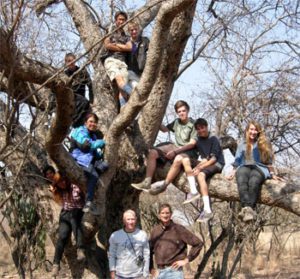
Twenty Ocean View High School (OVHS) students were the first to participate in the GSP. Two separate groups traveled to Mankwe Wildlife Reserve and Pilanesberg National Park in the summers of 2012 and 2013 to conduct field work aimed at understanding the brown hyena and other endangered species impact on ecosystems and biodiversity of the area with Brandon Knight, who led the International Baccalaureate program at OVHS.
For local service, students led a restoration project within a dedicated site at the Bolsa Chica Reserve used as the control site in a research study to compare natural vs chemical methods of invasive plant removal and native plant restoration. Students cleared the control area down to the mineral soil using hand tools, then planted 450 one-gallon native plants. They were then responsible for the area’s maintenance and natural efforts to establish the native plants over the course of 9 months. Students established monitoring protocols to determine the area’s planting success/failure rate. They drafted a summation of the project results for the control site and presented them at a Bolsa Chica Land Trust town hall event with Huntington Beach City Council Members in June 2014.
The Bolsa Chica Land Trust is a non-profit formed in 1992. Their mission is “the acquisition, preservation and restoration of all of the Bolsa Chica and the education of the public to its natural wonders and cultural significance.” The Trust has been instrumental in the protection of the wetlands and uplands at Bolsa Chica.
Orange High School 2012/13
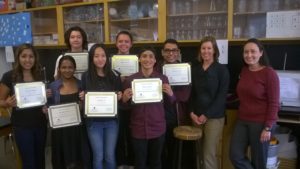
Nine GSP students from Orange High School assisted Dr. Jennifer Funk and Dr. Jason Keller in their research at Chapman University. Dr. Funk’s research is aimed at understanding how plants respond to reduced water availability, the factors contribute to plant invasiveness, and the functional traits of invasive and native species. Research in Dr. Keller’s lab is focused on understanding how ecosystems function and how these functions will respond to ongoing global change.
Students completed research tasks in the lab at Chapman University, including sample preparation, seed measurements, root measurements and data entry. Students also took precise measurements of small samples of leaf and soil matter for chemical analysis. Using a microbalance, they prepared small tins containing samples and ran them against a standard curve for comparison. These samples were also analyzed for both nitrogen and carbon content, revealing important characteristics of their growth and storage capacities. At Dr. Funk’s University of California, Irvine field site, students measured plant growth under different watering conditions at multiple points throughout the growing season. They also participated in field site and plant maintenance. After completing the Chapman University research, students traveled to Mankwe Wildlife Reserve and Pilanesberg National Park to conduct fieldwork aimed at understanding the brown hyena and other endangered species impact on ecosystems and biodiversity of the area.
The students were led by Amelia Strickland, their A.P. Environmental Studies teacher. They were accompanied to South Africa by Ms. Strickland and Nick Teller, a graduate student who oversaw their work in the lab at Chapman University.
San Clemente High School 2013/14
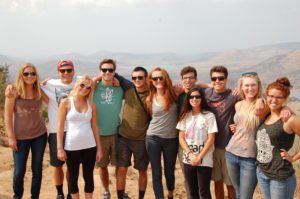
Before their research expedition to Mankwe Wildlife Reserve in South Africa, the San Clemente High School GSP team designed field guides for the San Mateo Creek watershed to be used by future high school biology students. The San Mateo Creek is the last native creek in Southern California that flows from its point source to the ocean, naturally and unobstructed. It is a very unique habitat in danger of being lost. It is important that the community understands what a unique, beautiful, endangered area they have at their back door.
The GSP students developed a multi-disciplinary curriculum incorporating the history, culture, and field science of this unique region. At the watershed, students designed field stations that visitors will move through as they learn about endangered and unique plants and animals of the region. The field curriculum includes information about the native tribes that originally inhabited the area, why the watershed is a biological hotspot, the habitat of the endangered pocket mouse, a quadrat of the coastal sage scrub, the riparian community, and water testing in the estuary. GSP students produced teacher packets with pre-field trip information, three different versions of the field study, and questions to check for understanding of the material. They also put together a journal for future visitors to record information about the local culture, historical facts and watershed maps.
In June, 2014, The GSP students were recognized by trustees of the San Onofre Parks Foundation for creating the first high school level educational and interpretive program for use by the park docents and teachers in field studies for community members.
Segerstrom High School 2015/16

In Summer 2016, ten advanced placement Segerstrom High School (SHS) students traveled to Mankwe Wildlife Reserve and Pilanesberg National Park in South Africa on a 12-day research expedition to assist Earthwatch Scientists in their efforts to study the impact of de-horning endangered rhinos on their behavior and on the larger ecosystem. Before departing, GSP students assisted Amigos de Bolsa Chica in invasive species remediation, implementing a water conservation system and docent programs at the Bolsa Chica Ecological Reserve. They also took part in in the Crystal Cove Alliance Citizen Science Marine Protected Area monitoring program.
With the leadership of Mr. Pfeifer, their A.P. Environmental Studies teacher, GSP students established an ongoing service collaboration between SHS and Bolsa Chica Ecological reserve that continues today. SHS students regularly contribute their time as citizen scientists at the reserve, removing invasive species, collecting seeds and re-planting native plants. As docents, they help educate the public about drought resistant native plants, the importance of wetlands and the critical role the Bolsa Chica Ecological Reserve plays for birds, marine life and endangered species.
Mr. Pfeifer, and Jerry Donohue, Board Chair of Amigos de Bolsa Chica, led the students in their local project and accompanied them to South Africa. Amigos De Bolsa Chica is a nonprofit organization that advocates the preservation, restoration, and maintenance of the Bolsa Chica Ecological Reserve.
Whitney High School 2016/17
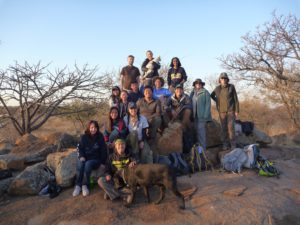
Before their 12-day research expedition to study endangered rhinos in South Africa, 10 Whitney High GSP students collaborated with Tidal Influence, to restore the Los Cerritos Wetlands in phase two of the Zedler Marsh Trails Project. Students removed trash and eradicated non-native vegetation including: mustard, slender leaf ice plant, yellow sweet clover, Russian thistle, and common dandelions from the areas adjacent to the wetlands trail system. They planted and monitored native plants such as sagebrush, bush sunflower and California buckwheat at this coastal sage scrub and alkali meadow habitat. In addition to the above restoration activities, students constructed benches and developed pathways that were essential to opening this space to the public in summer, 2017. Students were led by their A.P. Biology teacher, Aileen Perry and Latia Blair, a Tidal Influence Scientist, who both traveled to South Africa with the students.
The Los Cerritos Wetlands is a coastal marshland habitat located in Long Beach, California and is one of two of the last remaining salt marshes in LA County. The wetlands are home to several endangered species. Having been used for oil operations over many decades, the wetlands are recovering from poor soil and limited plant diversity. Visit www.intoloscerritoswetlands.org for more information about Los Cerritos Wetlands.
